Overview
Joining an adult autism support group can be a transformative experience, offering vital benefits like emotional support, social connections, and educational resources that significantly enhance the well-being of autistic individuals. These groups create a nurturing environment where members can share their experiences openly, fostering lasting relationships and providing valuable knowledge. Together, these elements contribute to improved mental health and a profound sense of belonging within the community.
Imagine a space where you can connect with others who truly understand your journey. These groups not only support individual growth but also encourage a collective strength, making it easier to navigate the challenges of daily life. By participating, you can learn from shared stories and insights, which can be incredibly empowering.
If you or someone you know is seeking a supportive community, consider reaching out to a local autism support group. It’s a step towards building connections that can lead to lasting friendships and a greater sense of fulfillment. You are not alone on this journey; there is a community ready to embrace you.
Introduction
In a world where understanding and support for autism are crucial, the role of community is truly invaluable. Autism support groups serve as essential lifelines, providing individuals and families with a nurturing space to connect, share experiences, and access vital resources. These groups not only offer emotional support but also empower their members through education, advocacy training, and skill development.
By cultivating a culture of acceptance and understanding, these communities play a significant role in enhancing the quality of life for autistic individuals and their families. As the autism community continues to face various challenges, the importance of these supportive networks grows, underscoring their transformative impact on personal growth and social integration.
About ASD Media: Empowering Parents with Resources for Autism Support
At ASD Media, we are dedicated to enhancing the implementation of ABA therapy by providing parents and professionals with vital resources. Our mission is to empower families as they navigate the complexities of developmental assistance, ensuring they have access to the latest insights and strategies that can make a real difference. A recent study found that children with the lowest adaptive levels maintained gains over time in ABA, underscoring the effectiveness of these resources and the hope they bring.
By nurturing a community where experiences can be exchanged, the adult autism support group plays a crucial role in connecting individuals with the essential resources needed to assist their loved ones effectively. We understand the challenges faced by families, and we are here to support you. Additionally, Medicaid plays a vital role in ensuring that children with developmental disorders can access the care they require to flourish. This highlights the significance of financial assistance in obtaining necessary resources for these conditions.
Our organization emphasizes ongoing professional development for ABA therapists, which enhances the quality of care provided to families. This commitment not only improves outcomes but also strengthens the support network available to families, particularly through the adult autism support group, reinforcing the impact of community support on autism advocacy. Together, we can create a nurturing environment through an adult autism support group that fosters growth and understanding for all families affected by autism.
Community Building: Fostering Connections Among Autistic Adults
An adult autism support group serves as a vital platform for autistic adults to connect with others who share similar experiences. These connections can blossom into enduring friendships and foster a sense of belonging, both of which are essential for emotional well-being. By participating in the adult autism support group gatherings, individuals can engage in conversations that resonate with their unique challenges and triumphs, ultimately cultivating a supportive network that enriches their social lives.
Furthermore, the burden of concealing one's true self can lead to autistic burnout, underscoring the importance of support networks in providing a space for understanding and validation. The ongoing conversation surrounding developmental disorder diagnoses highlights the need for inclusivity and understanding, showcasing the transformative potential of receiving an official diagnosis. This newfound clarity not only enhances personal insight but also paves the way to crucial resources that promote social integration.
Research indicates that peer relationships within an adult autism support group can lead to improved mental health outcomes, reinforcing the significance of belonging. As Brian shared, "I’ve been able to get a good—good network of people—to some extent. They’re mostly online, now, ‘cause I haven’t made full close friends down here," illustrating how these connections can bridge the gap between virtual and in-person interactions, ultimately nurturing a vibrant community for autistic adults.
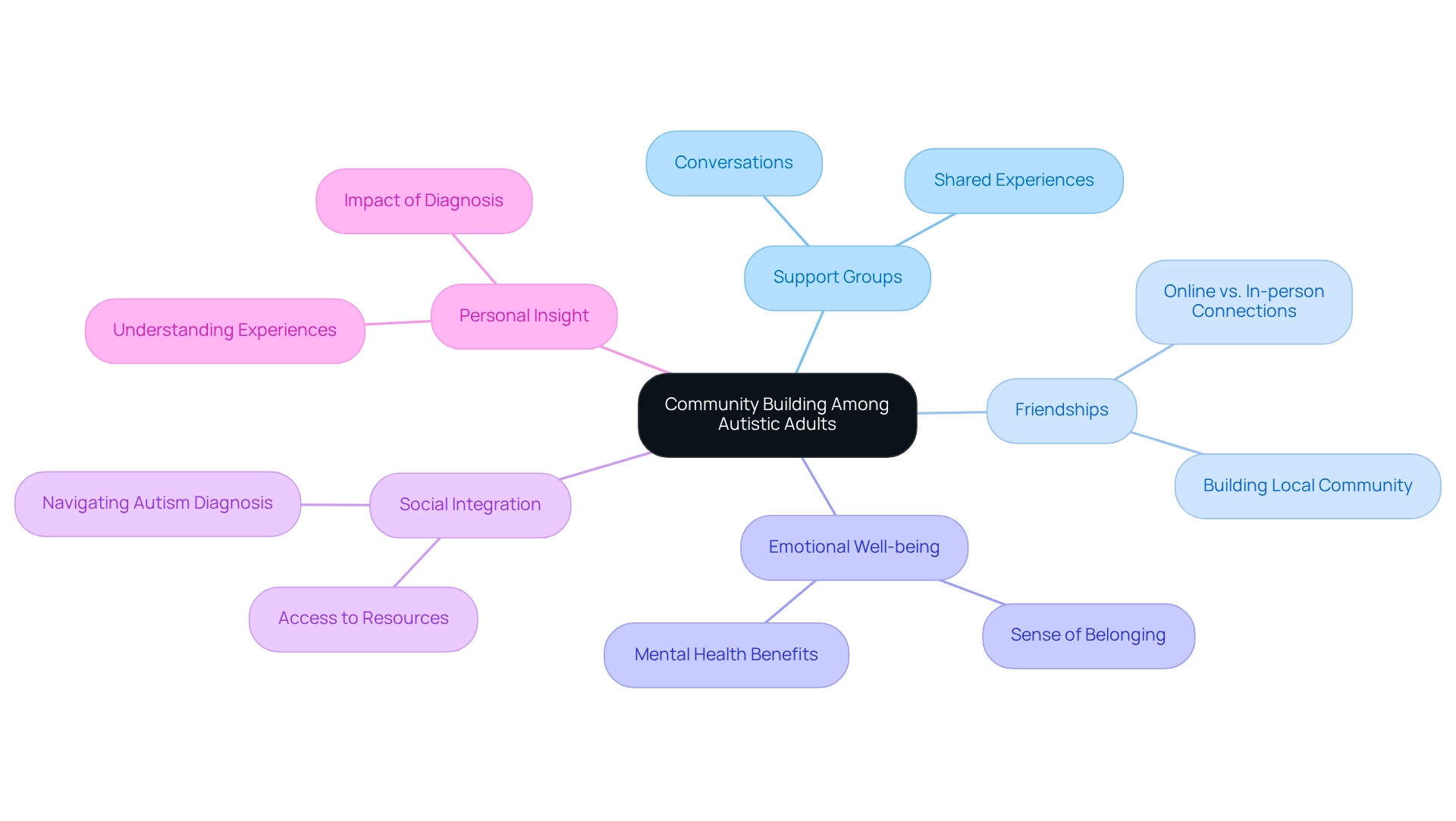
Emotional Support: Sharing Experiences and Reducing Isolation
Support groups, such as an adult autism support group, serve as vital sanctuaries for autistic individuals, offering a judgment-free space where they can openly share their experiences. This sharing not only validates their feelings but also significantly alleviates feelings of isolation. Research shows that increased loneliness among adults with autism is closely associated with heightened levels of depression and anxiety. By connecting with peers in an adult autism support group who genuinely understand their challenges, participants find essential comfort and encouragement that are crucial for nurturing mental health and emotional resilience.
Tim Nicholls from the National Autistic Society emphasizes that loneliness can persist even in social settings, highlighting the importance of supportive networks. He advocates for understanding and acceptance, stressing that such support can empower autistic individuals to lead fulfilling lives. The emotional benefits of sharing experiences in an adult autism support group are profound, fostering a sense of belonging and community, which ultimately enhances mental well-being.
For those seeking to understand more, I encourage you to explore the article with DOI: https://doi.org/10.1007/s40489-022-00330-w. Your journey towards understanding and support can make a significant difference.

Educational Opportunities: Gaining Knowledge About Autism Spectrum Disorder
Support groups play a vital role in providing educational resources and workshops that empower participants with essential knowledge about autism spectrum disorder (ASD). These programs showcase the latest research, therapeutic approaches, and effective strategies for tackling autism-related challenges. For instance, research indicates that participation in autism workshops significantly enhances knowledge retention, enabling individuals to make informed choices regarding their care and support. This knowledge not only strengthens personal advocacy but also nurtures a deeper understanding of the complexities surrounding ASD.
Moreover, linking survey data with administrative claims data, as discussed in the case study "Linking Data Sources for Better Insights," has proven effective in uncovering the experiences and needs of the autistic community. This ultimately informs advocacy efforts and policy changes. By engaging in these educational opportunities, individuals can navigate the resources available to them more effectively, ensuring they are well-equipped to advocate for themselves and others on their journey.
Importantly, 50% of autistic youth in the U.S. who access vocational rehabilitation begin those services in high school, underscoring the significance of educational resources in preparing individuals for future opportunities. Additionally, the U.S. Department of Education reports that 8% of autistic students in the U.S. do not complete high school, compared to 5% of all students. This statistic highlights the critical need for improved assistance and advocacy.
By actively pursuing educational opportunities within support networks, individuals can enhance their advocacy efforts and contribute to a more informed community. Together, we can foster an environment where everyone feels empowered and supported in their journey.
Advocacy Training: Empowering Autistic Adults to Voice Their Needs
Support networks play a crucial role in advocacy training for the adult autism support group, equipping autistic adults with the essential skills needed to effectively voice their needs and rights. This training covers a variety of topics, including:
- Effective communication with service providers
- Navigating complex healthcare systems
- Advocating for necessary accommodations in educational and workplace environments
By promoting self-advocacy, these organizations instill a sense of agency and confidence in participants.
A recent study highlighted the Strong Together intervention, demonstrating strong feasibility and acceptability. Participants were randomly assigned to a treatment set (N = 20) or a wait-list control set (N = 21). These findings underscore the significance of organized advocacy training within assistance networks. Additionally, case studies illustrate how advocacy skills can be applied in practical situations, such as the adaptability of ABA strategies in both educational and domestic settings. This emphasizes the notion that consistent assistance across different environments can greatly enhance outcomes for autistic individuals.
Ultimately, adult autism support groups not only empower autistic adults to express their needs but also contribute to a broader culture of resilience and advocacy within the autism community. As one parent wisely remarked, 'I don’t always possess all the answers, but I do have Google.' This highlights the importance of seeking information and support on this journey. We encourage you to reach out, share your experiences, and explore the resources available to help foster a nurturing environment for your loved ones.
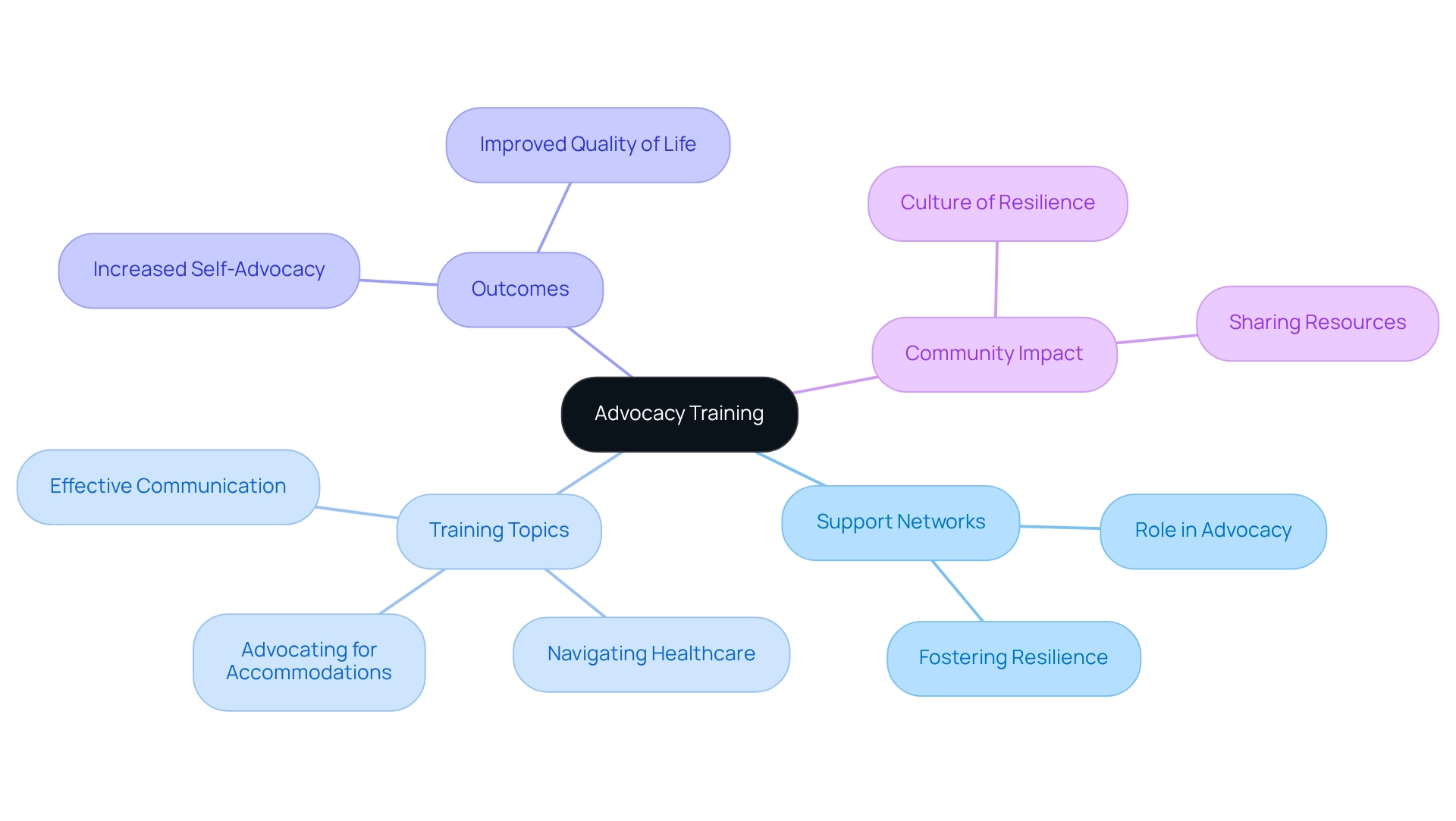
Resource Sharing: Accessing Valuable Information and Services
An adult autism support group serves as an essential hub for resource sharing, allowing members to exchange valuable information about local services, therapies, and support programs. This collaborative environment nurtures a wealth of knowledge that can significantly assist individuals on their journey. For instance, a monthly General Session within an adult autism support group for adults on the spectrum provides a platform for sharing experiences and gaining insight into the condition, which fosters personal growth and awareness. This session not only facilitates discussions but also leads to actionable insights that members can apply in their lives.
Moreover, statistics reveal that less than 1 in 4 parents receive recommendations to assistance networks from their diagnosing clinicians. This highlights the crucial role these connections play in bridging gaps in access to resources. As Julian Hannush observed, 'Understanding autism can be lifesaving, and we must all contribute to collectively diminishing the stigma surrounding the disorder...' By engaging in an adult autism support group, members can discover suggestions for therapists, educational programs, and community events, enhancing their overall wellbeing and empowering families to navigate the complexities of autism together.
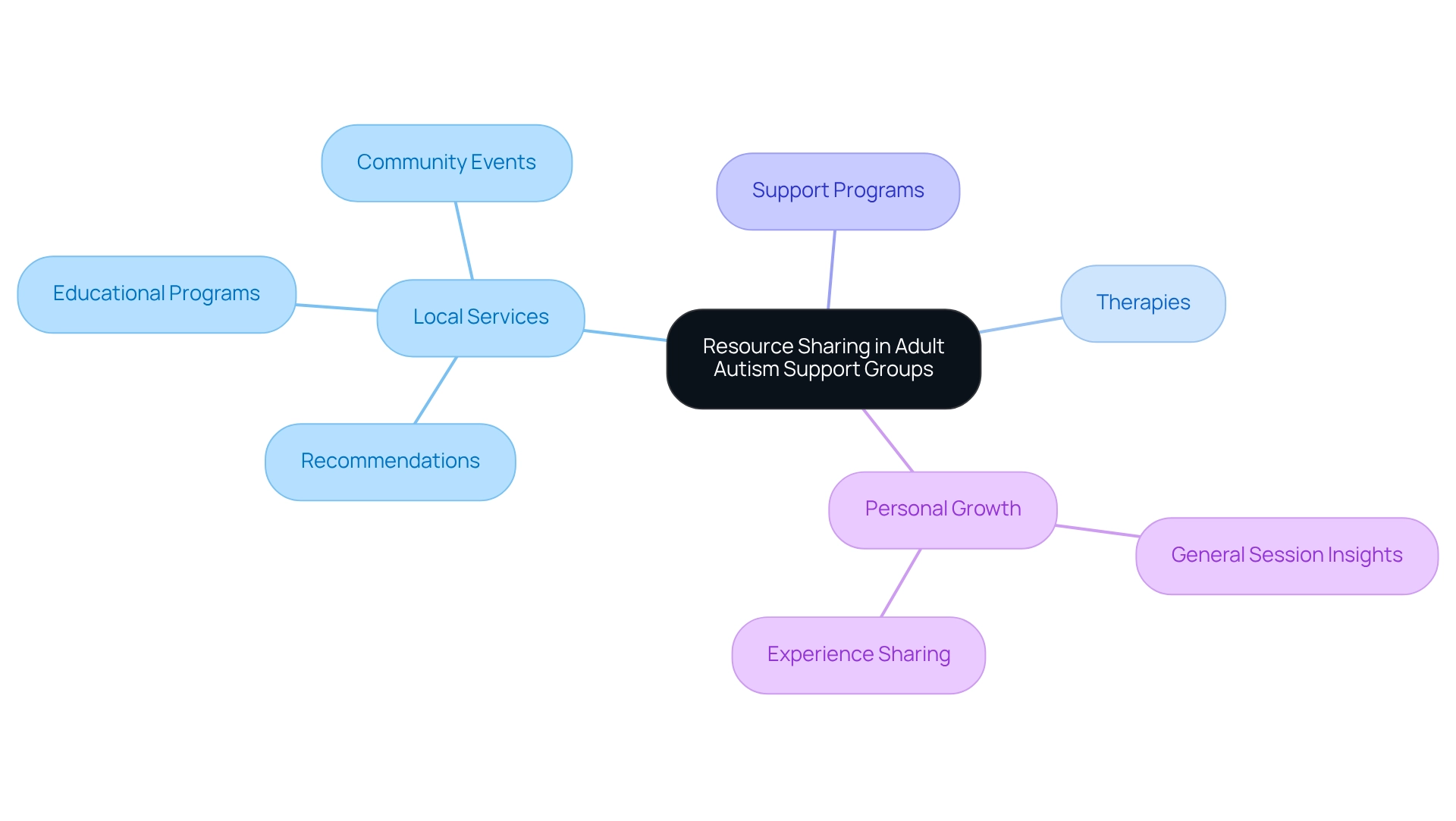
Skill Development: Enhancing Social Skills and Daily Living Abilities
An adult autism support group is vital for developing essential skills, offering a variety of workshops and activities aimed at enhancing social skills and daily living abilities. Participants can immerse themselves in role-playing exercises, communication training, and practical life skills workshops, all thoughtfully designed to encourage personal growth. These enriching experiences not only boost individual capabilities but also cultivate a profound sense of accomplishment and confidence, which are crucial for tackling everyday challenges.
Research shows that engaging in organized collective activities can significantly improve social skills among autistic individuals. A meta-analysis highlighted a remarkable effect size of 59.14 (19 degrees of freedom, p < 0.01), demonstrating a strong positive influence on skill development outcomes. This finding emphasizes the effectiveness of these programs in nurturing essential social skills.
Therapists underscore the importance of these skill enhancement opportunities, emphasizing that participation in an adult autism support group can lead to meaningful improvements in social interactions. Grace W. Gengoux from Stanford University points out that employing a random effects model in studies can provide clearer insights into the overall effect size, reinforcing the value of organized assistance. By fostering a cooperative environment, these teams not only enhance personal abilities but also cultivate a supportive community that encourages ongoing learning and development.
Have you or someone you know experienced the benefits of such programs? Sharing your stories can inspire others and highlight the importance of these supportive networks.
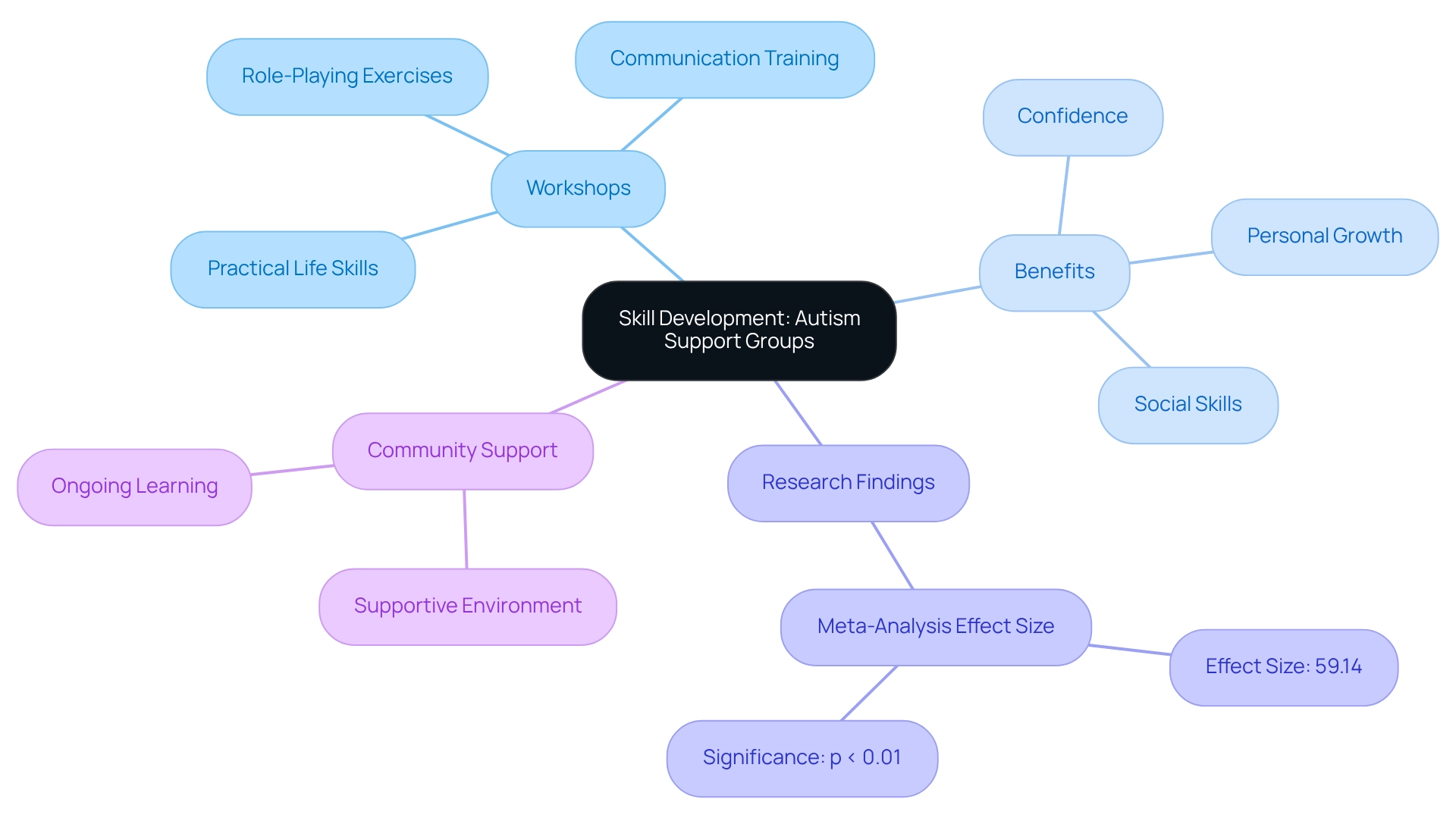
Peer Support: Connecting with Others Who Understand Your Journey
Peer support is a vital aspect of adult autism support groups, providing individuals with a unique opportunity to connect with others who genuinely understand their experiences. This bond fosters a deep sense of belonging and validation, allowing members to share their challenges and victories in a supportive environment. Research shows that after just three months of engaging with a peer supporter, autistic individuals report fewer unmet needs and a significant increase in their engagement with mental health services, with some studies indicating an improvement of up to 30%.
The relationships formed within these groups often extend beyond meetings, leading to lasting friendships that greatly enhance social networks. These peer connections not only enrich the overall support experience but also promote emotional resilience among participants. In fact, satisfaction levels in traditional support models frequently fall below 80%, highlighting opportunities for program improvement and emphasizing the necessity for more effective, peer-driven approaches that prioritize understanding and shared experiences.
Case studies reveal that traditional support models, where non-autistic individuals provide assistance, can create power imbalances and misunderstandings. This dynamic underscores the importance of an adult autism support group as a peer support service tailored specifically for autistic individuals, ensuring their unique needs are met with empathy and understanding. As Steve Gauin, a parent and advocate, shares, "The fact that it is a Catholic institution means there are masses, there are certain ceremonies around that theme. And Nick has gotten so much out of all that."
By building friendships within autism support networks, individuals not only gain emotional encouragement but also create a system that empowers them to advocate for their needs more effectively. Furthermore, enhancing cultural competence among peer specialists can significantly improve the effectiveness of these support services, ensuring they are inclusive and responsive to the diverse needs of the community.
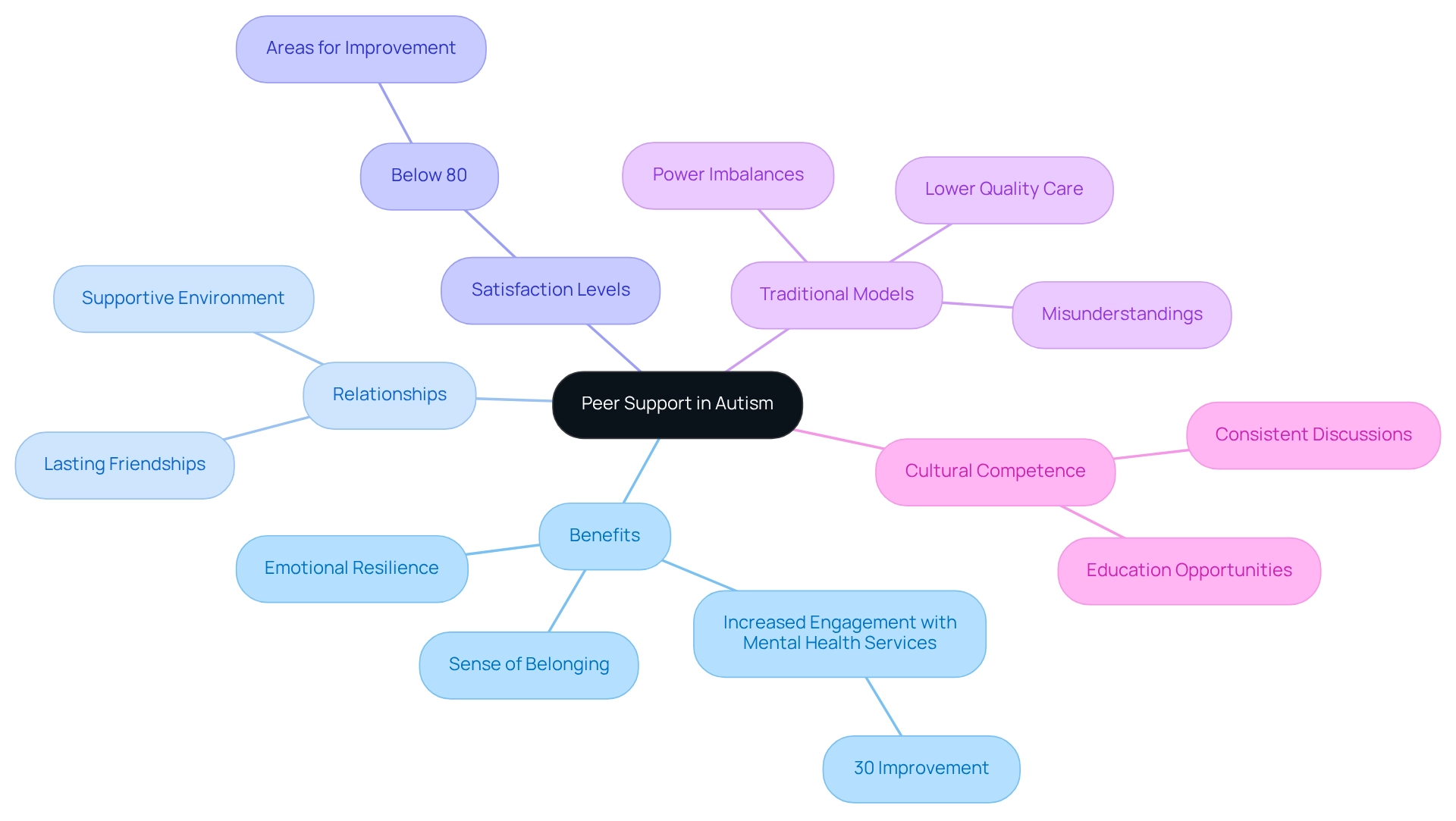
Safe Space: Creating an Environment for Open Discussion and Growth
Support networks serve as vital safe havens where individuals can freely express their thoughts and emotions without the shadow of criticism. This nurturing atmosphere encourages honesty and vulnerability, allowing members to explore their identities and experiences deeply. By cultivating a space of acceptance and understanding, these communities not only promote personal growth but also aid in emotional healing. Research underscores the importance of empathetic listening and nonjudgmental interactions in creating psychological safety, as illustrated in a case study on empathy's role in therapeutic settings. This approach builds trust, encouraging clients to share their experiences more openly.
Such supportive environments have been proven to significantly enrich discussions, fostering deeper connections and insights among members. As Christi Venable, Founder of Smile Therapy Services, poignantly states, "It’s time to break the stigma and create safer spaces for mental health conversations at work now." The role of vulnerability in personal development is paramount; it is through these candid conversations that individuals can truly reflect on their challenges and triumphs. In 2025, the emphasis on creating secure environments within adult autism support groups remains crucial, as it directly impacts the emotional well-being and growth of autistic individuals. Statistics reveal that 11.5k individuals have participated in discussions highlighting the positive effects of such safe spaces, reinforcing their importance in encouraging open dialogue.
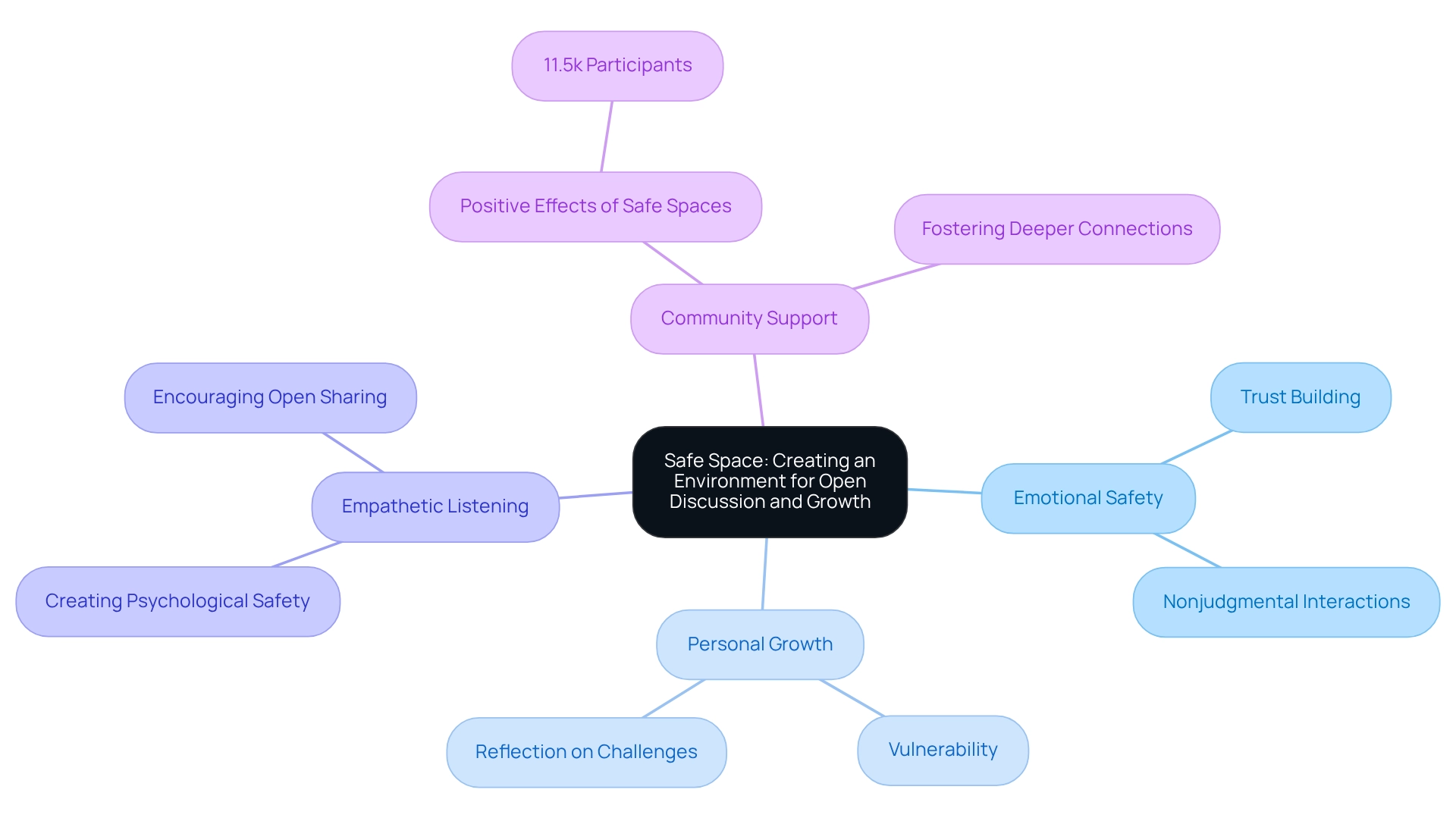
Long-Term Benefits: Sustained Support and Community Engagement
Engaging in an adult autism support group provides lasting benefits that extend well beyond immediate support. Members of the adult autism support group often find that their involvement nurtures enduring connections and fosters ongoing engagement within the adult autism support group community. This continuous participation in an adult autism support group cultivates a profound sense of belonging and establishes a dependable network, which is invaluable during challenging times.
Research indicates that sustained community involvement can lead to improved mental health outcomes for participants in an adult autism support group. Studies reveal that individuals active in an adult autism support group report higher levels of resilience and overall well-being. For example, a case study from the A.J. Drexel Autism Institute highlights that 87% of participants in assistance circles experienced significant improvements in their quality of life, emphasizing the vital role these communities play in enriching the lives of autistic individuals.
Moreover, community organizers stress that long-term involvement in adult autism support groups not only strengthens personal relationships but also fosters a collective resilience that uplifts all members. As Julian Hannush aptly stated, "Autism awareness can be lifesaving, and we must all do our part to collectively reduce the stigma around the disorder." This perspective underscores the importance of community support and engagement in cultivating a culture of empathy and understanding.
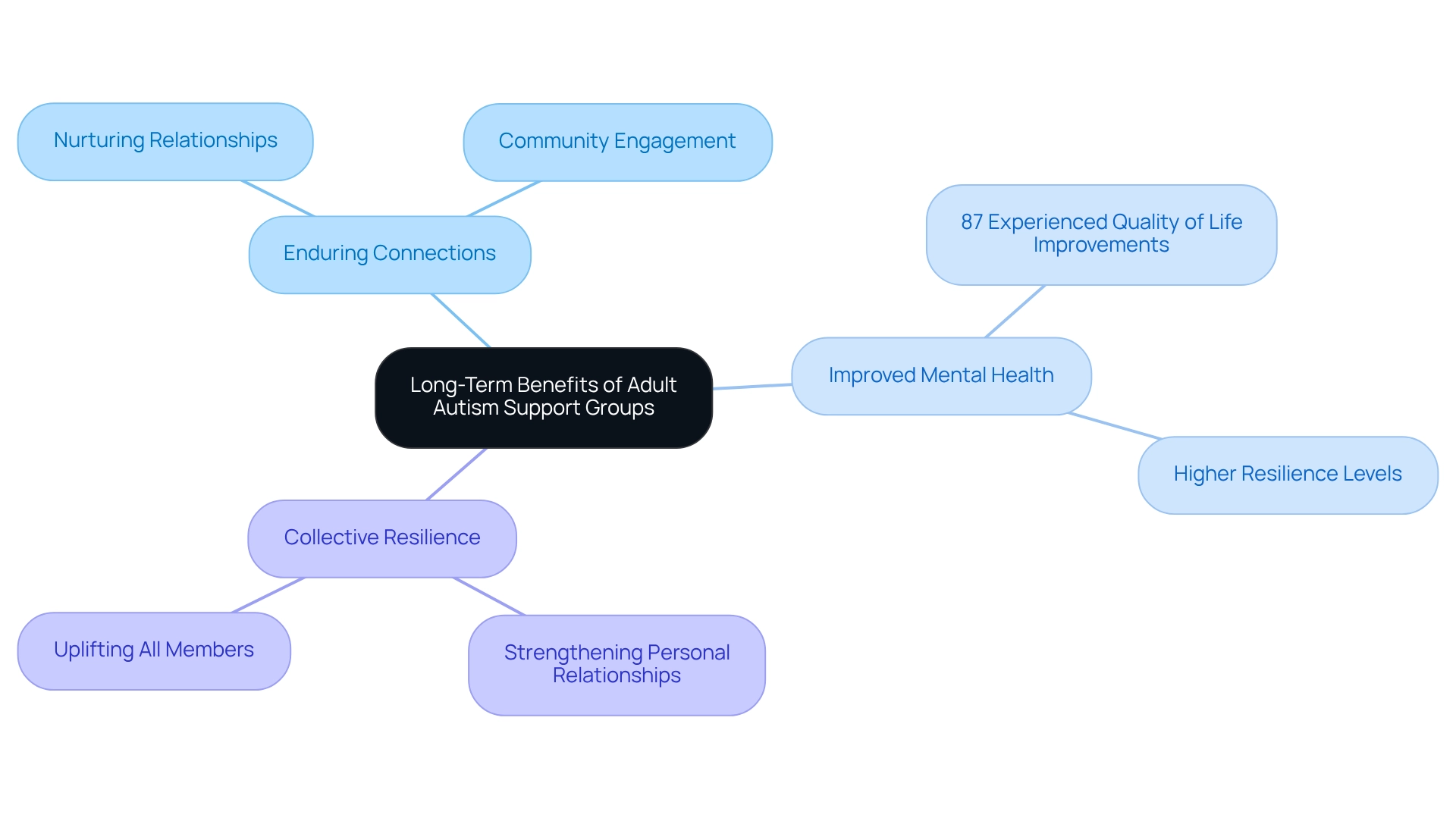
Conclusion
The role of autism support groups is truly transformative. They provide vital resources and foster a sense of community for individuals and families affected by autism. These groups serve as essential platforms for emotional support, allowing members to share experiences, reduce feelings of isolation, and develop lasting friendships. By creating a judgment-free environment, they encourage open discussions that enhance personal growth and emotional resilience.
Moreover, support groups play a crucial role in education and advocacy. They equip participants with knowledge about autism and empower them to voice their needs effectively. Through workshops and peer interactions, individuals gain valuable skills that not only improve their social capabilities but also enhance their overall quality of life. The importance of resource sharing within these communities cannot be overstated, as it helps bridge gaps in access to essential services and therapies.
Ultimately, the long-term benefits of engaging in autism support groups are profound. Members often discover a sustained sense of belonging and a robust support network that continues to provide assistance during challenging times. As the community grows stronger and more interconnected, it fosters a culture of understanding and acceptance, which is essential for the overall well-being of autistic individuals. The collective efforts of these groups not only empower individuals but also contribute significantly to a more inclusive society. This highlights the importance of community in the journey of navigating autism. Together, we can create a more supportive environment for everyone.
Frequently Asked Questions
What is the mission of ASD Media?
ASD Media is dedicated to enhancing the implementation of ABA therapy by providing parents and professionals with vital resources to empower families as they navigate developmental assistance.
How does ASD Media support families dealing with autism?
ASD Media offers access to the latest insights and strategies, fosters community through support groups, and emphasizes ongoing professional development for ABA therapists to improve the quality of care.
What role does Medicaid play in supporting children with developmental disorders?
Medicaid is vital in ensuring that children with developmental disorders can access necessary care, highlighting the importance of financial assistance in obtaining resources for these conditions.
What is the purpose of the adult autism support group?
The adult autism support group serves as a platform for autistic adults to connect, share experiences, and foster a sense of belonging, which is essential for emotional well-being.
How can participation in the adult autism support group benefit individuals?
Participation can lead to enduring friendships, improved mental health outcomes, and a supportive network that helps alleviate feelings of isolation and validates personal experiences.
What are the emotional benefits of sharing experiences in an adult autism support group?
Sharing experiences in a judgment-free space helps validate feelings, reduce isolation, and foster a sense of community, which enhances mental well-being and emotional resilience.
Why is understanding and acceptance important for autistic individuals?
Understanding and acceptance empower autistic individuals to lead fulfilling lives, as highlighted by Tim Nicholls from the National Autistic Society, who emphasizes the need for supportive networks to combat loneliness.




